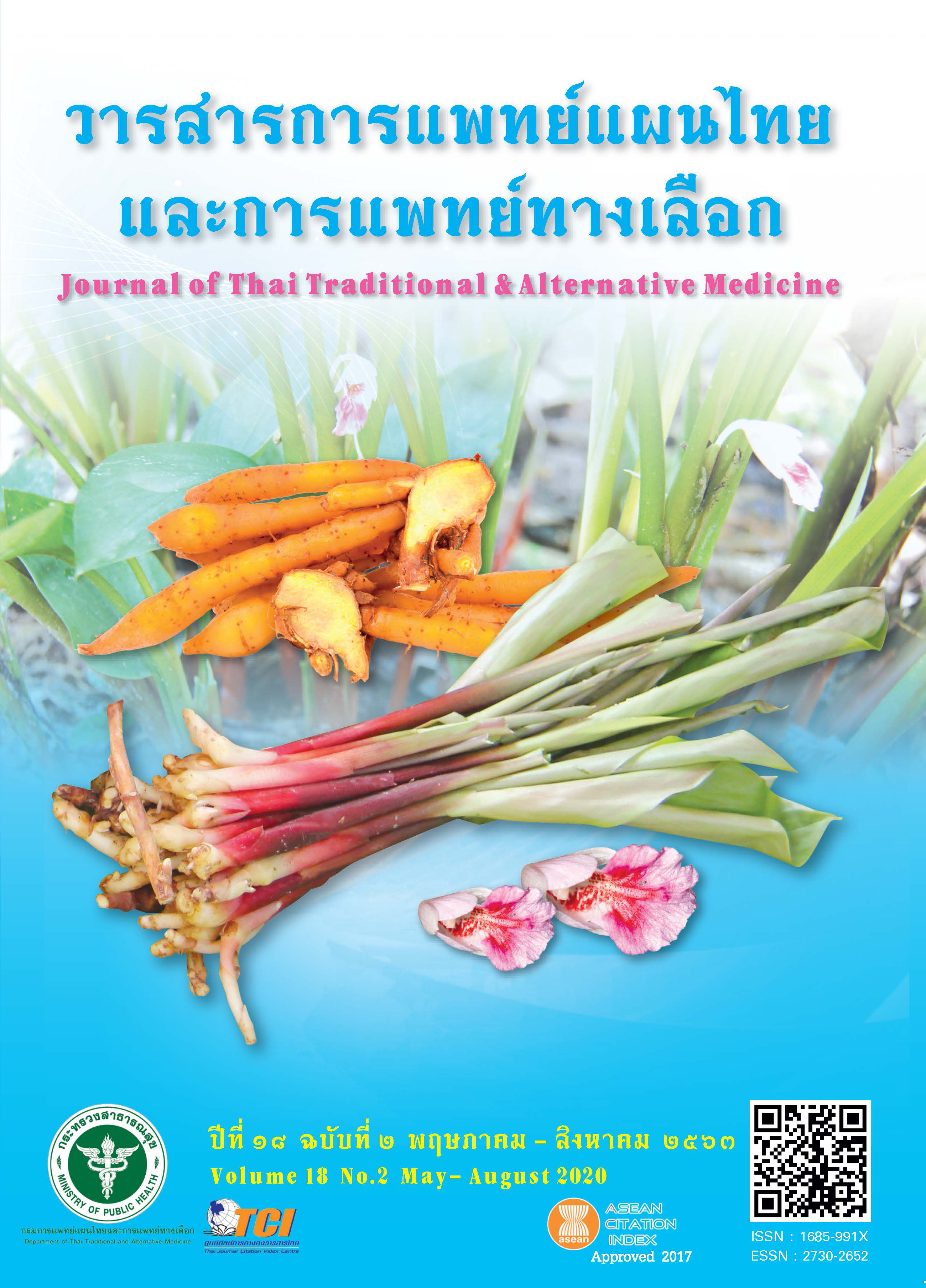Efficacy and Safety of Plook-fai-tat Formula to Increase Milk Volume in Post-partum Women with Lactation Insufficiency
Main Article Content
Abstract
Plook-fai-tat is a Thai traditional herbal medicine formula in Mahachotirat scripture, Thai Traditional Medicine Textbook for Obstetrics and Gynecology diseases, used for augmenting breastmilk production. Plook-fai-tat has been officially included in the National List of Essential Medicines since 2012. The objective of this study was to determine efficacy, safety and patient satisfaction of Plook-fai-tat formula in increasing milk volume in postpartum mothers who have lactation insufficiency. Forty-nine subjects who had normal spontaneous vaginal delivery at term in Sung-noen and Si-kiew Hospitals voluntarily participated in the study. The participants were randomly assigned to receive Plook-fai-tat formula (3 g/day in 4 divided doses, n = 24) or placebo (n = 25). It was found that mean breastmilk volumes increased significantly in both groups within 3 days after start taking the prescribed products (p < 0.001). Mean breastmilk volumes were 51.01 ± 54.97 ml in the Plook-fai-tat formula group and 43.12 ± 40.08 ml in the placebo group: however, these increases were not statistically significant different (p = 0.567). Nevertheless, it was worth noting that in the Plook-fai-tat formula group, there were 6 persons (25%) who had an increased mean breastmilk volume of 110 ml or more, which was significantly higher than that of the placebo group which only 1 person (4%) was found (p < 0.05). No adverse reaction was detected among both groups. The result indicates that the galactogenic effect of Plook-fai-tat formula was not significantly different from that of placebo; however, the proportion of nursing mothers who had an increased breastmilk volume of 110 ml and higher in Plook-fai-tat group was significantly higher than that in the placebo group. This herbal formula is safe as no adverse drug reaction was observed.
Article Details
References
Sawaddiworn S. Specificity of breast feeding and effects on baby health. In: Woramongkol N, editor. Manual of specialist breastfeeding training. Bangkok: Agricultural co-operative federation of Thailand printing house; 2007. p. 31-43. (in Thai)
Angkasuwapala N. “Smart Breastfeeding Smart Citizen”. In Proceeding book for 4th national breastfeeding academic conference; 2013 Jun 5-7; Miracle Grand Convention Hotel, Bangkok. p. 18-9. (in Thai)
Naka S, Temkate P, Hengrai L, Kongmeesuk N. The effects of helping mother and infant for the proper breastfeeding position by male participation in the Health Promoting Hospital, Regional Health Promotion Center 4, Ratchaburi. Ratchaburi: Inpatient Department, Nursing Group, Health Promoting Hospital, Regional Health Promotion Center 4, Ratchaburi; 2010. (in Thai)
Silva OP, Knoppert DC, Angelini MM, Forret PA. Effect of domperidone on milk production in mothers of premature newborns: a randomized, double-blind, placebo-controlled trial. CMAJ. 2001;164(1):17-21.
Rachuso S. Effectiveness of domperidone in breast milk production augmentation of term cesarean deliveries mothers. Buddhachinaraj Medicine Journal. 2009;26(2):168-72. (in Thai)
Asztalos EV, Campbell-Yeo M, DaSilva OP, Kiss A, Knoppert DC, Ito S. Enhancing breast milk production with domperidone in mothers of preterm neonates (EMPOWER trial). BMC Pregnancy and Childbirth [Internet]. 2012 Aug [cited 2019 Nov 5]; 12(87): [6 screens]. Available from: http://www.biomedcentral.com/1471-2393/12/87
Thai Traditional Medicine Development Foundation and School of Ayurvedic Thai Traditional Medicine. Mahachotirat scripture. In: The Textbook of Thai Traditional Medicine 1st Book 2007. Bangkok: Agricultural co-operative federation of Thailand printing house; 2012. p. 279. (in Thai)
National List of Essential Medicines Development Sub-committee. Plook-fai-tat, Thai Traditional herbal medicine formula. In: Manual of Herbal Medicine Usage in National List of Essential Medicines B.E. 2555 (2012). Bangkok: Agricultural co-operative federation of Thailand printing house; 2012. p. 52. (in Thai)
Chusilp K. Infant Breastfeeding Assessment (LATCH Assessment). In: Muttamara S, Chusilp K, Suthutvoravut U, Sangtaweesin W, Hangchaowanich Y, editors. Textbook of breastfeeding. Bangkok: Aiyara Publisher; 2012. p. 163-71. (in Thai)
Saejueng K. Efficacy of Wang Nam Yen herbal tea on human milk production: a randomized placebo-controlled trial. Ubon Ratchathani: Obstetrics-Gynecology Department, Sapphasitthiprasong Hospital; 2018. (in Thai)
Wichitsukhon K. Breastfeeding: Best start of life. In Proceeding book for 4th national breastfeeding academic conference; 2013 Jun 5-7; Miracle Grand Convention Hotel, Bangkok. p. 66-74. (in Thai)
Yimyam S, Tiensawad S, Srisawad S, Supphansan P, Mooncheep T. Effect of herbal drink on stimulating breast milk production in postpartum women. Chiangmai: Nursing Department, Chiangmai University; 2016. (in Thai)
Forinash AB, Yancey AM, Barnes KN, Myles TD. The use of galactogogues in the breastfeeding mother. Annual Pharmacotherapy. 2012;46(10):1392–404.
Wannapat M, Suthutvoravut S, Suwikrom S. Effectiveness of domperidone in augmenting breastmilk production measured by manual expression in postpartum women in Charoenkrung Pracharak Hospital. Ramathibodi Medical Journal. 2018;41(1):17-26.
European medicines agency: science medicines health. CMDh confirms recommendations on restricting use of domperidone-containing medicines: European commission to take final legal decision. EMA. 2014;236452.
Wechwithan S, Sriphirom P. Domperidone: warning at drug labeling and drug documentation. Medicinal and Health Product Bulletin. 2016;19(4):97–100. (in Thai)
Yimyam S. Galactagogue herbs. Nursing Journal. 2018;45(1):133–45. (in Thai)


